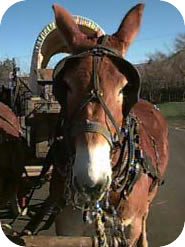Heritage Gateways
Official Sesquicentennial K-12 Education Projectsponsored by the Utah State Board of Education, the BYU-Public School Partnership and the Utah Education Network
William Clayton Journals
May 24, 1847

Summary: Horses not as strong as the oxen now. Mules are doing well. Souix Indians.
Journal entry: Monday: The morning very cold indeed, strong wind from northwest.
At 8:25 we continued our journey and traveled over level prairie ten miles, then halted to feed at 12.45. The bluffs on the north about two miles from us and the river one mile.
About noon the weather began to moderate and grow warmer. While we were resting two Indians came to camp, their object evidently being to get the dog which has followed us to this place. They tarried a little while and then went away taking the dog with them.
At 3:00 p. m. we again proceeded and traveled till 6:00 p. m, distance six and a half miles, during the day 16 1/2. Several of the horse teams gave out and they are evidently failing but the oxen are gaining daily. The mules stand the journey well and in fact, all the teams considering the scarcity of grass.
About 5:30 we discovered a party of Indians on the opposite side the river moving west. When we formed our encampment they crossed over the river. Some of the brethren went to meet them carrying a white flag with them. When the Indians saw the flag, some of them began to sing, and their chief held up a U. S. flag. It was soon ascertained that their object was to obtain something to eat. A number of them came to the camp and were conducted around by Colonels Markham and Rockwood. They were shown a six and fifteen shooter also the cannon and the gunners went through the evolutions a number of times which seemed to please them much.
They are all well dressed and very noble looking, some having good clean blankets, others nice robes artfully ornamented with beads and paintings. All had many ornaments on their clothing and ears, some had nice painted shells suspended from the ear, All appeared to be well armed with muskets. Their moccasins were indeed clean and beautiful. One had a pair of moccasins of a clear white, ornamented with beads, etc. They fit very tight to the foot. For cleanness and neatness, they will vie with the most tasteful whites. They are thirtyfive in number, about half squaws and children. They are Sioux and have two recommends certifying as to their friendship, etc. The brethren contributed something to eat which was sent to them.
Our course today has been nearly west, with a cool wind. The evening fine but cold enough to freeze clothing stiff when laid on the grass to dry. Elder Kimball has been quite unwell all day and mostly kept to his wagon. Opposite the camp on the south side the river is a very large rock very much resembling a castle of four stories high, but in a state of ruin. A little to the east a rock stands which looks like a fragment of a very thick wall. A few miles to the west Chimney Rock appears in full view. The scenery around is pleasant and romantic.
After the Indians had viewed the camp, they returned to their horses and the rest of the party who have camped on the banks of the river about a quarter of a mile west...
Source: William Clayton's Journal
Published by the Clayton Family Association, and edited by Lawrence Clayton. To the best of our research, this contents of this book are no longer under copyright.